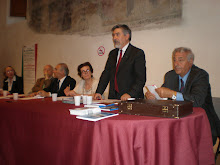It is not the so-called earthquake that was shocking, but the fact that some mainstream politicians profess to have been shocked by it. The results of the European Parliament elections on May 22nd-25th confirmed that the turmoil of recent years has exacted a significant political price. This should not surprise us. Worryingly, it is likely to hamper policymaking across the EU at a time when the bloc's institutions are in flux. In some countries—Germany and Italy particularly—voters appear content with and supportive of their leaders. But the results in countries such as France, the UK and Greece highlight the Sisyphean task—made worse by years of complacency—that policymakers now face in attempting to secure continent-wide approval for continuing—and, quite possibly, further—integration.
It is important to put the election results in perspective. Despite the high-profile success of various populist Eurosceptic forces, the European Parliament remains under the sway of the centre-left and centre-right parties (see chart below). Granted, these parties may struggle to respond in concert to the expansion of Euroscepticism in the parliament chamber from an irritant fringe to an emergent force. But the insurgents hold neither the levers nor the balance of power.
Home thoughts, from abroad
In so far as the elections herald a potential crisis of political legitimacy, they do so primarily at the national level. The EU's hybrid governance structures have manifold problems, but voters' only meaningful political relationships are with their domestic representatives. If there is a breakdown of trust, we should expect this to be at the national level. Just as during the euro zone crisis a national breakdown of individual governments' budget deficits was much more telling than an aggregate figure for the bloc, so the EU's democratic deficit is best understood not primarily as a deficiency at the European level (although it is certainly that too) but as a failure of national politicians to respond to their voters' concerns.

The most dramatic result of the election—the victory of the Front national (FN) in France—should be understood in this way, in national terms. It reflects a crisis in the French political system more than a crisis of Europe. The two mainstream parties have lost touch with the electorate. In 2012 voters wanted to get rid of the former president Nicolas Sarkozy, but they endorsed François Hollande only reluctantly. Mr Hollande's approval ratings almost immediately began to display a significant degree of regret on voters' part and have worsened steadily. However, there is no corresponding swing of the pendulum back towards Mr Sarkozy's Union pour un mouvement populaire (UMP). Instead, it is the far-right iconoclasts of the FN who have surged.
A similar pattern can be seen in the UK. Many voters wished to punish the two parties of the governing coalition, but without endorsing the centre-left opposition Labour Party, which, like the UMP in France, was all too recently the incumbent being punished. This explains the surge of the UK Independence Party (UKIP).
In both France and the UK, populist insurgents profited from a failure of the mainstream parties to connect with their electorates. In neither country did the two main parties manage to articulate (and thereby ease) voters' inchoate sense of dissatisfaction with the direction things have taken. Still less did they convince people that they could turn things around. This is also true in Greece, where Syriza Unifying Social Front (Syriza) was a clear victor; in Spain, where unprecedented fragmentation saw the combined vote of the two largest parties slump from 80% in 2009 to less than 50%; and in Ireland, where the deputy prime minister resigned following his party's electoral collapse.
Exaggerated reports of the mainstream's death
Contrast this with the results in Germany and Italy, where voters opted decisively not only for mainstream parties but for mainstream parties of government. They did so for opposite reasons. In Germany, the electorate is broadly content with policy and with the political mainstream's responsiveness to voters' interests. In Italy, the landslide enjoyed by Matteo Renzi's Partito Democratico (PD) showed the continuing power of mainstream politics when practised by a leader who is able to connect with the electorate.
Italy might have been the perfect breeding ground for a populist surge in these elections by Beppe Grillo's Movimento 5 Stelle, but Mr Renzi has dulled that movement's appeal by recognising what voters want and promising it to them: a radical departure from the sclerotic business-as-usual of Italian politics. In France and the UK, by contrast, no such clarity as to voters' preferences exists. Rather than steer the national mood, the mainstream parties in these two countries have appeared confused and buffeted by it. This has allowed a destabilising political vacuum to develop, opening an unusually large gap in the political market, which is being filled by charismatic leaders bearing simple political messages.
We should expect to see more of the same in coming years. We are at the beginning of a long electoral cycle across Europe that is likely to be more revealing of voters' disenchantment and disaffection than was the last such cycle. The previous cycle saw numerous incumbent governments ousted and replaced by their traditional rivals. But in many instances, these traditional rivals have been unable to deliver change on the scale that they explicitly or implicitly promised. So they too now find themselves battling their electorates' disaffection. Meanwhile, many voters appear willing to vote for "outsider" parties or candidates, who offer a more abrupt break with the status quo than do most mainstream opposition parties. Results in the Netherlands appear to have been an exception in this regard, with Geert Wilders' high-profile Party for Freedom (PVV) failing to match its pre-election expectations.
Parliamentary arithmetic now slightly more complicated
The impact of these elections at the European level is likely to be much less dramatic than it promises to be in a number of individual countries. Despite the surge in support for populist parties, a majority of seats is still controlled by the main groupings of the centre-right and centre-left. The two biggest groupings—the centre-right European People's Party (EPP) and the centre-left Progressive Alliance of Socialists and Democrats (S&D)—enjoy a relatively slim majority of 53%, but that figure is boosted by a further 10% if the Alliance of Liberals and Democrats for Europe (ALDE) is included.
The likelihood of such cross-party consensus is strong in many areas. Rival groupings vote together in the European Parliament much more commonly than is usually the case in national parliaments. One reason for this is that political rivalries between EU institutions are often sharper than those within them. But there will be areas in which centrist consensus will be more difficult to achieve and therefore in which the prospect of a Eurosceptic blocking will become more likely.
New free-trade deals are one possible such issue. In the context of heightened economic uncertainty and many voters' feeling that globalisation may be to blame, concerns about the impact of major trade deals (notably a proposed agreement with the US) could see a sufficient number of centre-left and centre-right parliamentarians rebel to make parliamentary approval difficult. Similarly, proposals to deepen the EU's single market for services are likely to generate a greater degree of protectionism across the parliament than might previously have been the case.
The culture of EU politicking is unlikely to change
However, anyone expecting a fundamental shift in the way EU politics works following the elections is likely to be disappointed. This will become apparent within days of the results' announcement, as attention shifts to the choice of a replacement for José Manuel Barroso as president of the European Commission. The Lisbon treaty, which came into force in late 2009, subtly increases the European Parliament's power in this area. The basic division of labour remains unchanged: the heads of EU member state governments propose a candidate for the job, who the parliament must then approve or reject. The change introduced by Lisbon is that the heads of government must now take account of the parliamentary election results when choosing their candidate.
The main groupings in the parliament have, unsurprisingly, adopted a maximalist interpretation of this new requirement. Prior to the election, each grouping selected a candidate for the Commission presidency—Jean-Claude Juncker for the EPP, Martin Schulz for the S&D—before busily spinning the line that in order to take account of the election results, the heads of government would have to nominate the candidate of whichever grouping emerged victorious. They have threatened to vote down any other candidate proposed by the heads of government.
The heads of government, in response, have said that they are under no obligation to take their instructions from the parliament. They are correct on this point, both formally and in terms of what the current political mood requires. Neither Mr Juncker (the former prime minister of Luxembourg) nor Mr Schulz (president of the European Parliament) can be said to embody the rejectionist spirit of the election results. This is not to say that the heads of government will be any more adventurous when they come forward with a candidate. On the contrary, the most likely outcome in the days ahead is a period of horse-trading both within and between EU institutions that confirms many voters' intuition that Europe's policymakers are deaf to their calls for reform.























































































Nessun commento:
Posta un commento